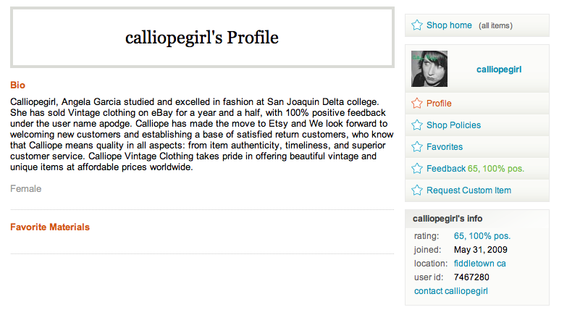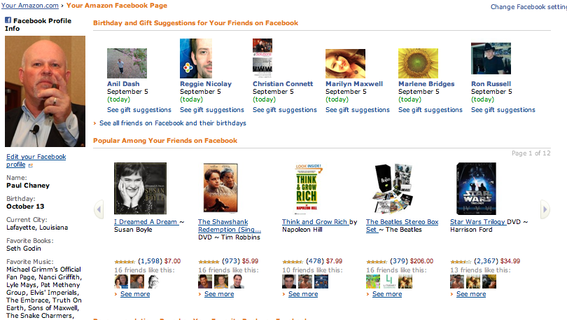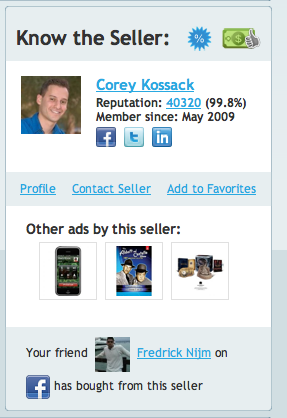“Trust” is likely the most defining factor when it comes to selling products online. Consumers will not purchase products from a merchant that they mistrust.
Social media can help overcome a consumer’s reluctance to purchase products due to lack of trust. It can foster interaction between an ecommerce site and its customers. It can facilitate customer reviews, feedback ratings, and shopping experiences. Consumers can tell the world whether they “Like” a merchant, or a product. And merchants can share details of themselves, such their names, faces, outside interests, and provide easy methods for consumers to communicate with them.
Taking these factors into consideration, I’ll compare some of the popular ecommerce portals and see how well they measure up. I’ll then offer four tips that you can implement on your own ecommerce site to foster communication with the visitors to your site, and instill trust in the process.
Critique of Major Ecommerce Portals
eBay
When making a purchase on eBay, I can see the seller’s user ID, total number of transactions, feedback rating based on percentage and reviews from purchasers. I can also ask sellers a question via a contact form and even visit their eBay stores.

Screenshot of eBay seller’s information.
What I cannot do is see the seller’s face, know their real names, or connect with them via social media. While some level of trust is gained, the relationship is impersonal. Because all interactions are managed through the platform, eBay essentially creates a barrier between the reseller, frustrating my ability to get to know them and me. As a result, more than once have I refrained from purchasing an item there simply because I wasn’t sure I could trust the seller.
Etsy
Etsy goes one better in terms of connecting me with the sellers. I can see their faces, know their names and read their bios. Like eBay, I can also see a feedback rating and read buyer reviews. I can make contact with the seller and visit his or her Etsy store.

Screenshot of Etsy seller’s profile and bio.
Though Etsy is slightly more personal than eBay, it still leaves a lot to be desired in terms of incorporating elements that foster trust. One glaring omission is some form of meaningful peer-to-peer interaction, which would seem to be a natural fit for the site. Where is the Facebook “Like” button, for example? (Etsy provides its own version, called a “heart,” but that feature pales in comparison.)
Amazon
Amazon has historically provided solid trust-building components as part of its platform, such as customer ratings and reviews and its infamous product recommendation engine. On the other hand, information Amazon provides about resellers is pretty much on par with eBay. These include feedback ratings, customer reviews, and the ability to contact the seller through the platform.
Amazon has distinguished itself lately by integrating with Facebook to provide a new layer of product recommendations. To test how this works, I went to my account, then found an ad on the right-hand column of the page, which invited me to join the beta program.

Screenshot of Facebook ad on Amazon.
After walking through the standard Facebook connection process, I was taken to my Amazon Facebook page where I could view things like birthday and gift suggestions for friends, find out which items have been purchased and are popular among friends, and even see recommendations on products from friends.

Paul Chaney’s Amazon Facebook page.
Addoway
A new entry into the marketplace is Addoway, a platform that reminds me of both eBay and Etsy, but which puts greater emphasis on transparency in terms of the buying and selling process.

Addoway home page.
Sellers create a personal profile that includes their names, photos, bios and links to social networks where they have presences. It doesn’t take long to see how advantageous this can be in terms of building trust and fostering a personal “corner grocer” relationship.

Screenshot of sample seller profile on Addoway.
Not only that, when users log into Addoway using Facebook Connect, the first thing they see whether their “Friends” have bought or sold anything. From there, users can browse through the items their friends have purchased and discover merchants their friends recommend.

Screenshot of “What Friends Are Buying” on Addoway.
Four Tips for Your Own Ecommerce Site
Use the following four ideas to help improve interaction and communication with your own customers.
- Facebook “Like” Button. In “Conversion Tip: Put Facebook ‘Like’ on Product Detail Pages,” a recent Practical Ecommerce article, conversion expert Charles Nicholls said that the impact of the Facebook “Like” button cannot be underestimated. It is becoming an “index of content on the web, where the index is built based on mass popularity, as opposed to an arbitrary Google algorithm,” said Nicholls. As such, its importance has implications not only where social media is concerned, but for search engine marketing as well.Inserting the “Like” button and other Facebook social plug-ins is relatively easy to do.
- Ratings and Reviews. If your ecommerce platform does not already incorporate the use of ratings and reviews, a number of cost-effective third-party software programs are available. Review-Scrpt.com, Rating-System and PowerReviews Express are three that come to mind.
- Blog I can think of no better way to build a relationship with customers than with a genuine, well-written, frequently updated, humanized blog.
- Facebook and Twitter. Having an active presence within these and other relevant social networks provides an ideal way for buyers and sellers to build genuine, personal relationships with each other from which trust, loyalty and advocacy can grow.
Conclusion
Reflect on the relevance of these examples, and consider how to apply trust-building elements to your own online store. Consider ways can you foster trust, including word-of-mouth sharing, recommendations and ideas to help your customers to get to know better.




